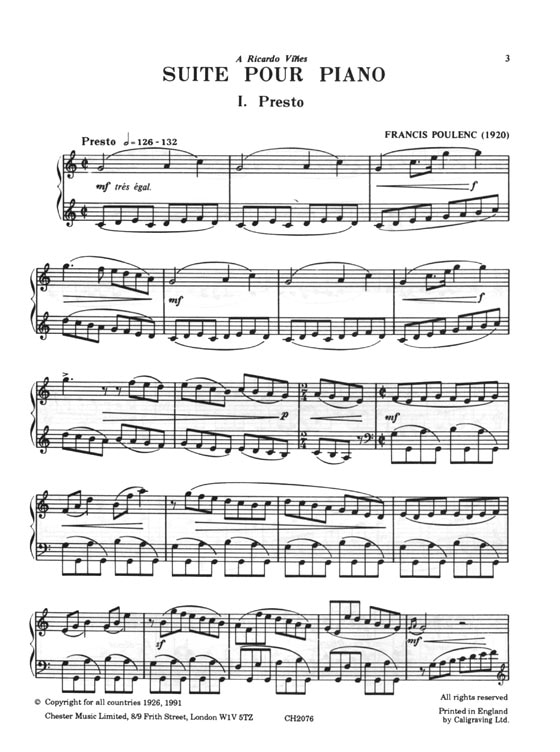
Happy Present Meet
Poulenc Suite for Piano Solo
A suite composed in 1920 in three movements
1. Presto
2. Andante
3. Vif
In January 1920 the critic Henri Collet named Poulenc and five composing friends 'Le Groupe des Six', by analogy with the Russian Five. It was aconvenient label for publicity purposes and Jean Cocteau, as their self-appointed spokesman, was quick to capitalise on the possibilities. But each of the Six always insisted that the group was just a collection of friends, withno communal musical aims. As it happened, Poulenc's Suite For Pianio and Impromptus for piano fit Cocteau's prescription quite well - they are clear, light-hearted and entertaining. But the Promenades, written in 1921 for ArturRubinstein, belong to the more serious side of Poulenc which was already struggling to make itself heard. This ten-movement celebration of different modes of transport explores a number of the new musical techniques which wereintriguing composers of the 1920s, and the resulting language must have seemed difficult to pianists of the time, although now it merely appears of its period.
1920년 1월, 비평가 앙리 콜레는 풀랑크와 다섯 명의 작곡가 친구들을 러시아 5인조에 비유하여 '6인조 그룹'이라고 불렀습니다. 이는 홍보 목적으로 편리한 명칭이었고, 자칭 대변인 장 콕토는 이 가능성을 재빨리 이용했습니다. 하지만 6인조는 모두 이 그룹이 단지 친구들의 모임일 뿐이며, 공동의 음악적 목표는 없다고 주장했습니다. 공교롭게도 풀랑크의 '피아노 모음곡'과 '피아노 즉흥곡'은 콕토의 처방에 매우 잘 들어맞았습니다. 명료하고, 가볍고, 재미있기 때문입니다. 그러나 1921년 아르투르 루빈스타인을 위해 작곡된 '산책'은 이미 자신의 목소리를 내기 위해 고군분투하던 풀랑크의 더 진지한 면모에 속합니다. 다양한 교통수단을 찬양하는 이 10악장은 1920년대 작곡가들에게 흥미로웠던 새로운 음악 기법을 탐구하며, 그 결과로 나온 언어는 당시 피아니스트들에게는 어렵게 느껴졌을 것이지만, 지금은 그저 그 시대의 언어로만 느껴진다.
작곡가 Poulenc, F(1899-1963)

Bach - Busoni Chaconne from Partita No.2 in d minor BWV 1004 for Piano Solo
Poulenc Trois Pieces (3 Pieces) for Piano
Poulenc Napoli Suite for Piano Solo
Rossini Overture to William Tell for 2 Pianos 8 Hands
Poulenc Trois Mouvements Perpetuels for Piano Solo
Poulenc 3 Novelettes (1999) for Piano Solo
[절판] 라벨집 1 (세계음악전집) for Piano Solo
Poulenc Napoli Suite for Piano Solo
[절판] Beethoven 32 Variations in c minor WoO 80 for Piano Solo